The Hindu Editorial (Staying accommodative) – Apr 08, 2021
Armed with a renewed mandate to contain inflation within a 2 percentage point range of the target 4%, and mindful of the pandemic’s latest wave, the RBI’s monetary policy committee… For further reading, visit “The Hindu”. Below is today’s word list-1 for The Hindu Editorial (Staying accommodative) – Apr 08, 2021.
To read this article, click here.
This preview is provided here with permission.
Courtesy: The Hindu
The Hindu Editorial (Staying accommodative) – Apr 08, 2021:
- accommodative (adjective) – aimed to encourage economic activity by reducing interest rates;
- cannot afford/can ill afford (phrase) – if you cannot afford to do something, you must prevent it from happening because it would be embarrassing and cause problems (if it happens).
- drop one’s guard (phrase) – to become less careful, to become less vigilant, to become less alert.
- price stability (noun) – no (drastic) change in the price of goods and services in an economy over a period of time. It implies avoiding both prolonged inflation and deflation.
- in search of (phrase) – searching for, seeking, looking for.
- arm with (verb) – prepare, make ready.
- mandate (noun) – instruction, directive, order; authority, approval, ratification, endorsement.
- inflation (noun) – simply meaning “cost of living”; an increase of price level of goods & services and vice versa decrease of currency value.
- percentage point (noun) – the difference between two percentages is termed as percentage point. (for example: “Interest Rates Jump From 10% to 12%”. In this case, the interest rate increased by “2 percentage points” or you can say that the interest rate is increased by 20%).
- mindful (adjective) – aware of, conscious of, heedful of.
- pandemic (noun) – the worldwide spread of a new disease; The illness spreads around the world and typically affects a large number of people across a wide area.
- monetary policy (noun) – monetary policy refers to the use of monetary instruments under the control of the central bank to regulate magnitudes such as interest rates, money supply, and availability of credit with a view to achieving the ultimate objective of economic policy.
- The monetary policy committee (MPC) (noun) – it is a six-member panel that is expected to bring “value and transparency” to rate-setting decisions. It will feature three members from the RBI — the Governor, a Deputy Governor and another official — and three independent members to be selected by the Government. The MPC will meet four times a year to decide on monetary policy by a majority vote.
- reaffirm (verb) – assert, state, assure again strongly.
- stance (noun) – position, approach, standpoint.
- projection (noun) – forecast, prediction, calculation.
- Gross domestic product (GDP) (noun) – a measure of economic activity in a country. It is the total value of a country’s annual output of goods and services.
- fiscal (year) (adjective) – financial year.
- notwithstanding (adverb) – nevertheless, nonetheless; in spite of, despite, regardless of.
- upsurge (noun) – sudden increase or rise of something; jump, upturn.
- novel coronavirus (nCoV) (SARS-CoV-2) (noun) – a new strain (type/variety) coronavirus that has not been previously identified in humans. (Courtesy: WHO)
- localised (adjective) – limited/restricted to a particular place.
- lockdown (noun) – an emergency protocol implemented by the authorities that prevents people from leaving from a place; An extended state of confinement/encirclement/isolation of a person by the authority.
- rationale (noun) – reason, reasoning/thinking, logic, grounds, basis.
- as long as (phrase) – provided that.
- durable (adjective) – long-lasting, strong, substantial, enduring, persisting, continuing.
- unambiguous (adjective) – unarguable, incontrovertible, unquestionable.
- (be) born of (verb) – exist (due to a particular situation).
- dampen (verb) – decrease, diminish/lessen, reduce.
- -intensive (adjective/usually in combination) – (in business) concentrating on a particular thing.
- restrain (verb) – control, regulate, restrict, prevent.
- impulse (noun) – (strong & sudden) urge/instinct, compulsion, need.
- prolong (verb) – extend, lengthen, protract.
- normalcy (noun) – a normal condition; normality, regularity.
- dip (verb) – decrease, fall/drop, slump.
- uncertainty (noun) – unpredictability, unreliability, riskiness/precariousness.
- cloud (verb) – mess up, spoil, ruin, vitiate.
- outlook (noun) – prospects, expectations, hopes, likely improvement, lookout, future.
- add to (phrase) – increase, intensify, heighten; aggravate, worsen, make worse, compound.
- IHS Markit (noun) – it is a global leader in information, analytics and solutions for the major industries and markets that drive economies worldwide. It partners with clients in business, finance and government to help them see the big picture with unrivaled insights that lead to well-informed, confident decisions.
- Purchasing Managers’ Index (PMI) (noun) – Purchasing Managers Index (PMI) is a monthly business survey data provided by IHS Markit. The monthly data are derived from surveys of senior executives at private sector companies. PMI data is used for accurate and timely insight into the health of a particular economy. The PMI data are used by financial and corporate professionals to better understand where economies and markets are headed, and to uncover opportunities.
- sentiment (noun) – general feeling, view, opinion.
- slide (verb) – fall, descend, decline.
- subsequent (adjective) – following, ensuing, successive.
- shed (verb) – discard, get rid of, do away with, dispose of.
- stress (noun) – trouble, difficulty, strain, pressure.
- efficacy (noun) – In medicine, the ability of an intervention (for example, a drug or surgery) to produce the desired beneficial effect; effectiveness, efficiency, power.
- vaccine (noun) – a biological preparation that improves immunity to a particular disease.
- persist (verb) – continue, remain, linger, stay.
- seek (verb) – try, aim, attempt.
- ramp up (phrasal verb) – increase (in amount or number).
- immunisation (noun) – the process whereby a person is made immune or resistant to an infectious disease, typically by the administration of a vaccine. Vaccines stimulate the body’s own immune system to protect the person against subsequent infection or disease.
- drive (noun) – campaign, crusade, movement, effort, push.
- foresee (verb) – anticipate, predict, envisage, envision.
- consumption demand (noun) – the demand for goods and services by individuals and households in the economy.
- rebound (verb) – recover (after a decline).
- any time soon (phrase) – in the very near future (but an exact time or date isn’t known).
- remit (noun) – scope, ambit, area of activity/responsibility; an item/thing for consideration.
- core inflation (noun) – it is a measure of the total inflation within an economy, excluding commodities such as food and energy prices (which change frequently).
- retail or consumer price index (CPI) inflation (noun) – it is a measure of the total inflation within an economy, including commodities such as food and energy prices. The CPI monitors retail prices at a certain level for a particular commodity. The change in the price index over a period of time is referred to as CPI-based inflation or retail inflation.
- harden (verb) – rise/increase and be fixed at a higher level steadily.
- across the board (phrase) – applying to all.
- basis point (BPS) (noun) – a unit of measure used in finance to describe the percentage change in the value or rate of a financial instrument. One basis point is equivalent to 0.01% (1/100th of a percent). Used for measuring change in interest rate/yield.
- cognisant (adjective) – aware, well informed about, familiar with.
- upside (noun as modifier) – positive, beneficial, advantageous (situation).
- downside (noun as modifier) – drawback, disadvantage, stumbling block/negative.
- downside/downward pressure (noun) – the negative movement of an economy. It refers to (economic) conditions when an economy has either stopped growing or is shrinking.
- upside/upward pressure (noun) – the positive movement of an economy. It refers to (economic) conditions when an economy is growing.
- trajectory (noun) – track/course, route, path, direction, approach.
- flag (verb) – indicate, identify, point out.
- stress (verb) – emphasize, draw attention to, highlight, underline, underscore.
- vital (adjective) – key, essential, important.
- ease (verb) – moderate, decrease, lessen, diminish, reduce, lower.
- tax burden (noun) – tax incidence/burden falls on the public.
- given (preposition) – considering, taking into account, bearing in mind.
- ripple effect (noun) – an event (or a process/action) that causes several other events to happen indirectly one after the other. knock-on effect, secondary/indirect effect, consequence/implication, chain of events; domino effect.
- logistics (noun) – the process of planning and executing the efficient transportation and storage of goods from the point of origin to the point of consumption.
- push up (phrasal verb) – increase, raise.
- pose (verb) – constitute, present, create, cause (a problem or danger or risk).
- far (adverb) – much.
- harder comparative adjective of hard (adjective) – difficult, complicated, complex.
- influence (verb) – affect, have an effect on.
- variables (noun) – something (an element/factor) that is subjected to change/vary.
- household (noun) – family, house.
- accelerate (verb) – increase, rise, surge.
- horizon (noun) – outlook, perspective, perception, purview.
- monetary authority/central bank (noun) – it refers to the institution responsible for managing the currency of a country, establishing interest rates, and controlling its money supply. The goals of a country’s central bank include stabilizing prices, fostering economic growth, and increasing employment. The Reserve Bank of India (RBI) is the central bank of India.
- at stake (phrase) – at issue, at risk; or in question.
- hard-earned (adjective) – relating to something earned by working hard.
- credibility (noun) – trustworthiness, reliability, integrity.
Note:
1. Click each one of the words above for their definition, more synonyms, pronunciation, example sentences, phrases, derivatives, origin and etc from http://www.oxforddictionaries.com/.
2. Definitions (elementary level) & Synonyms provided for the words above are my personal work and not that of Oxford University Press. Tentative definitions/meanings are provided for study purpose only and they may vary in a different context.
3. This word list is for personal use only. Reproduction in any format and/or Commercial use of it is/are strictly prohibited.
The Hindu Editorial (Staying accommodative) – Apr 08, 2021:
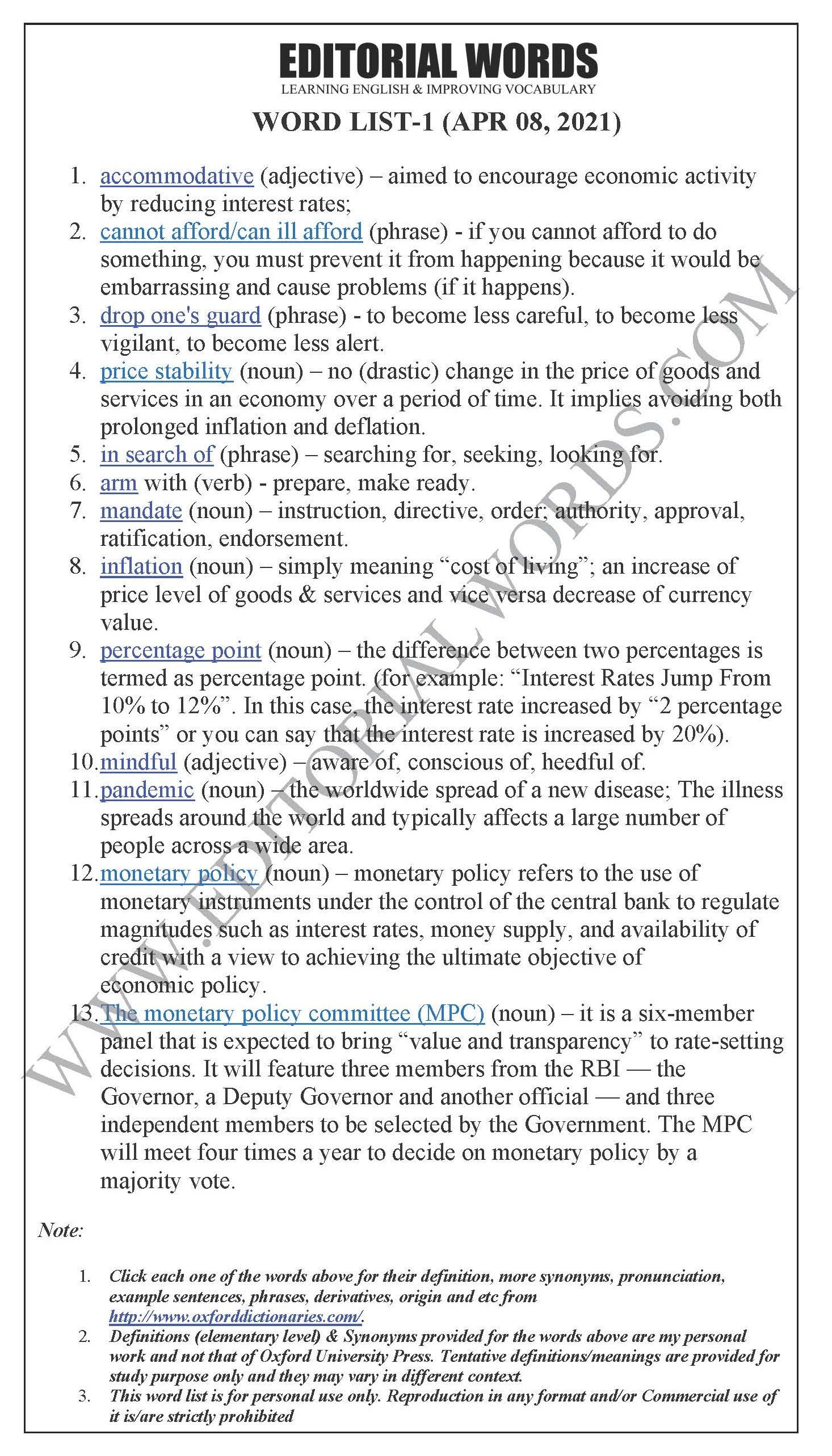
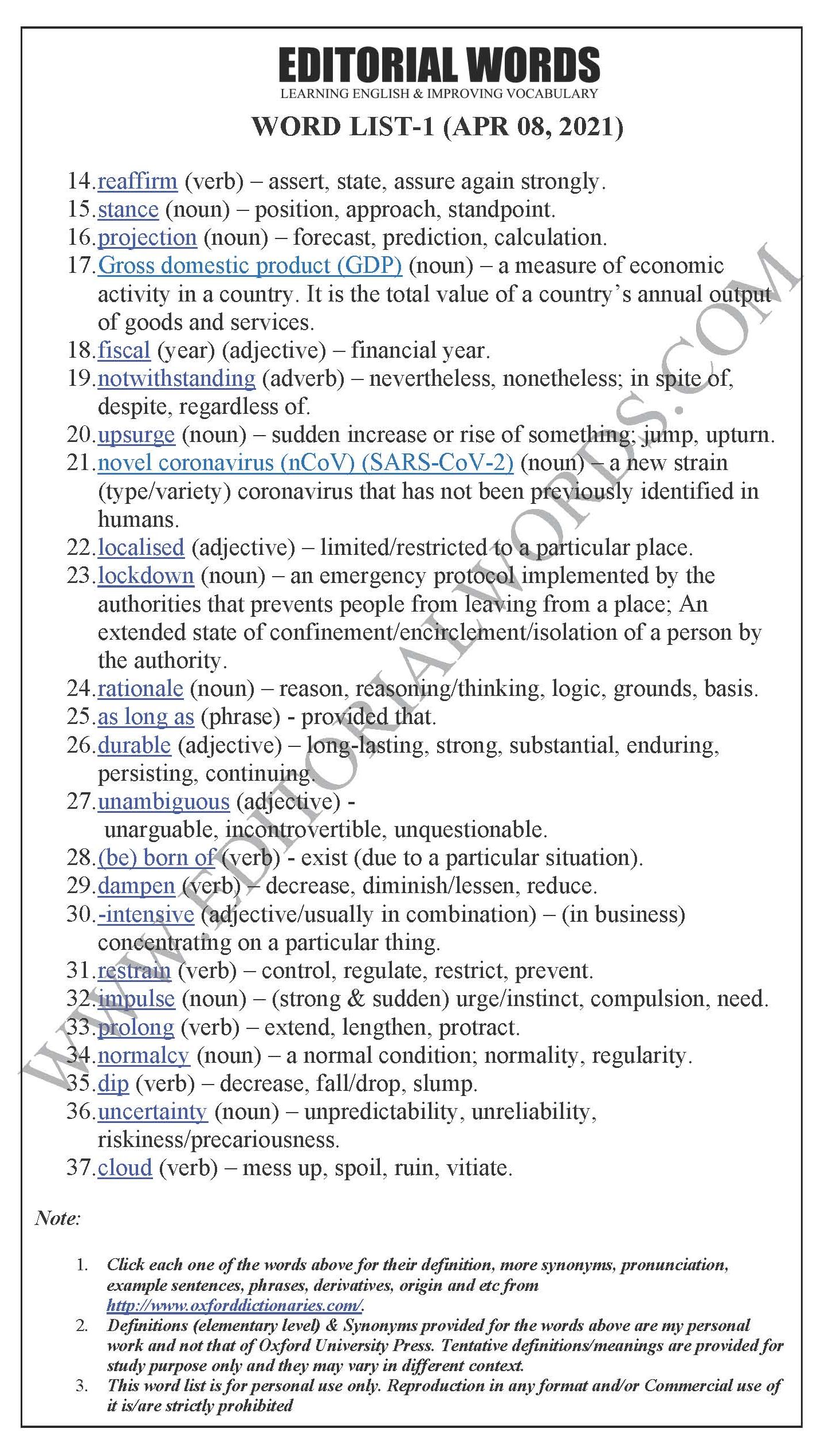
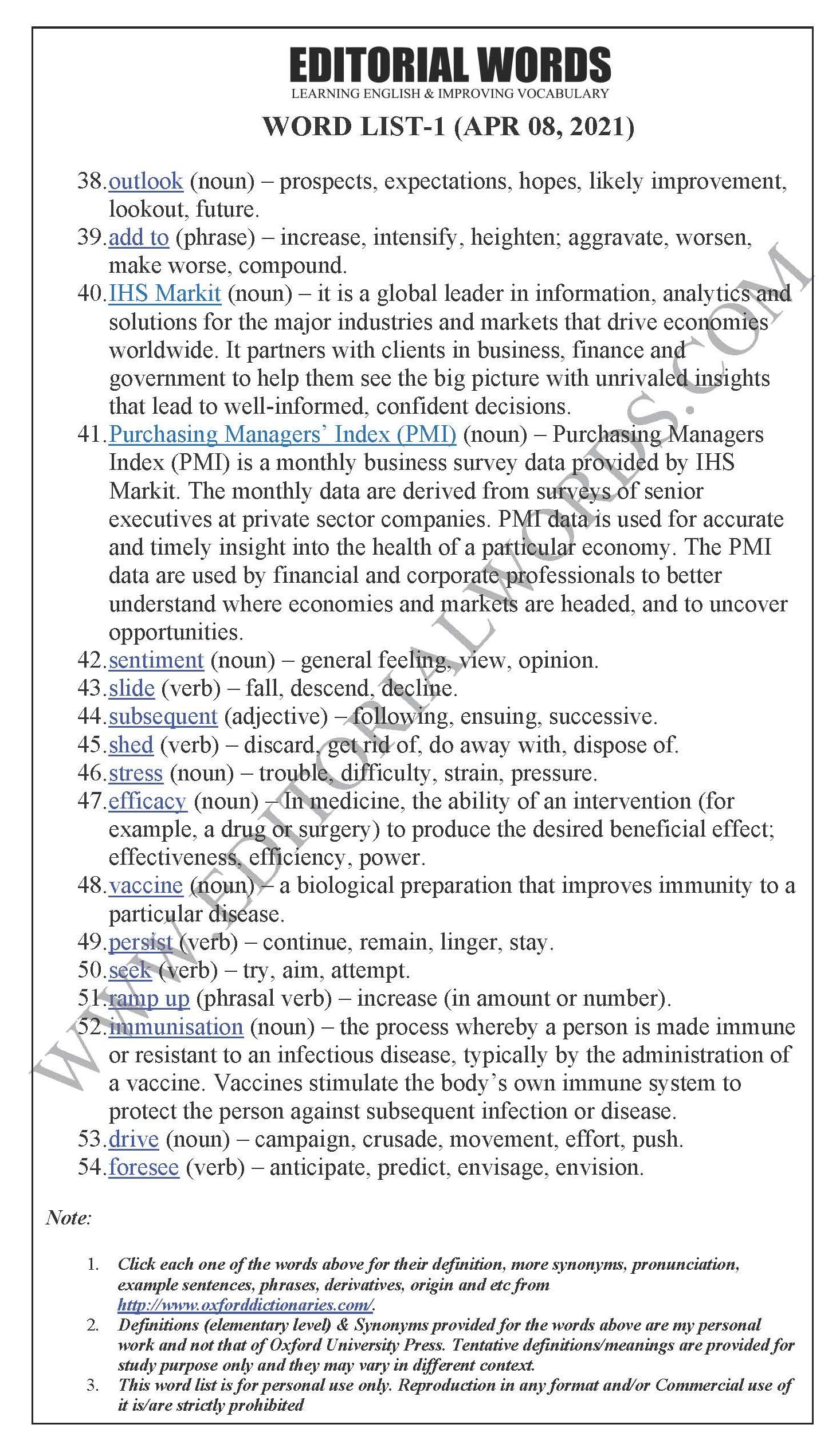
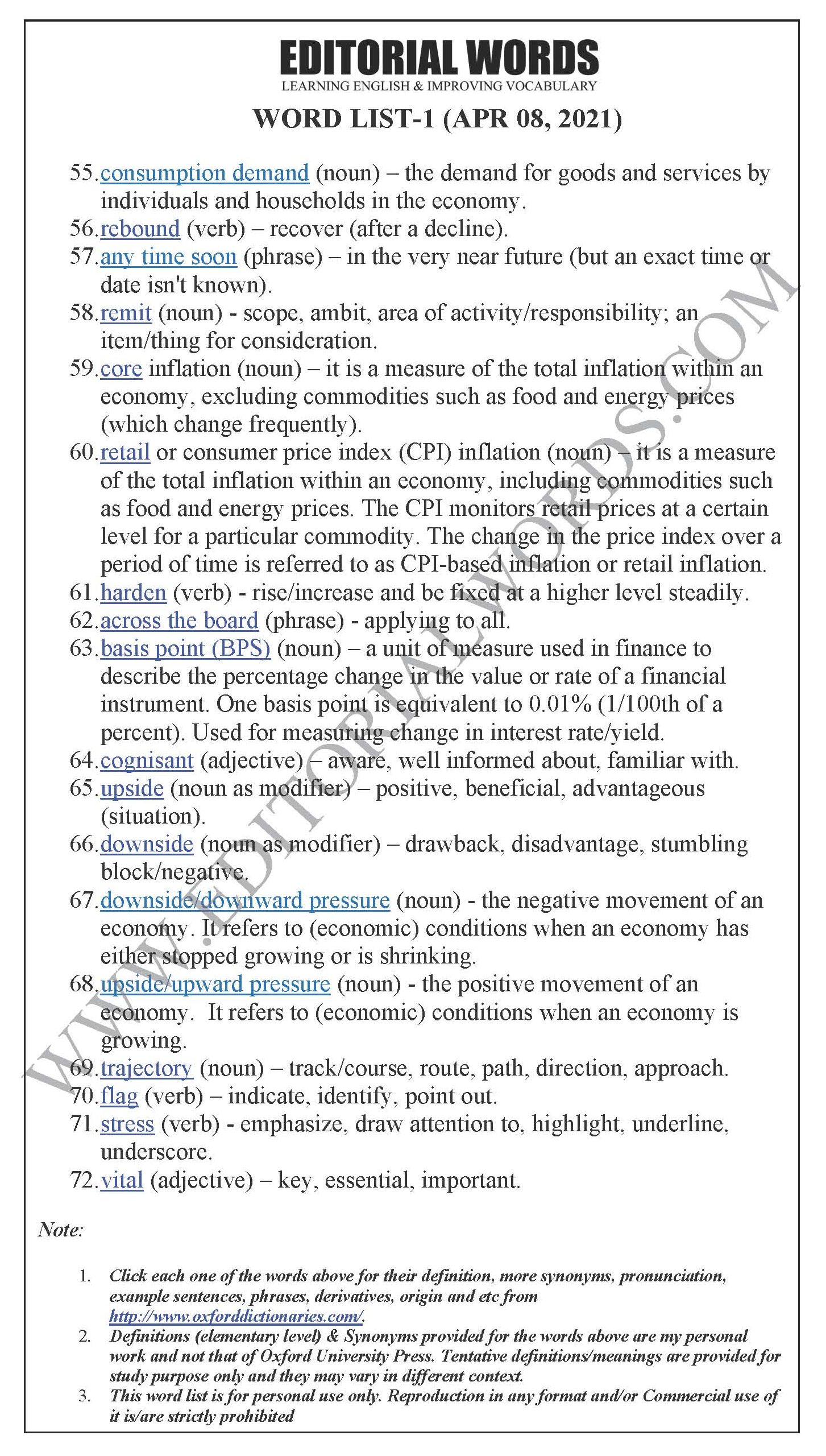
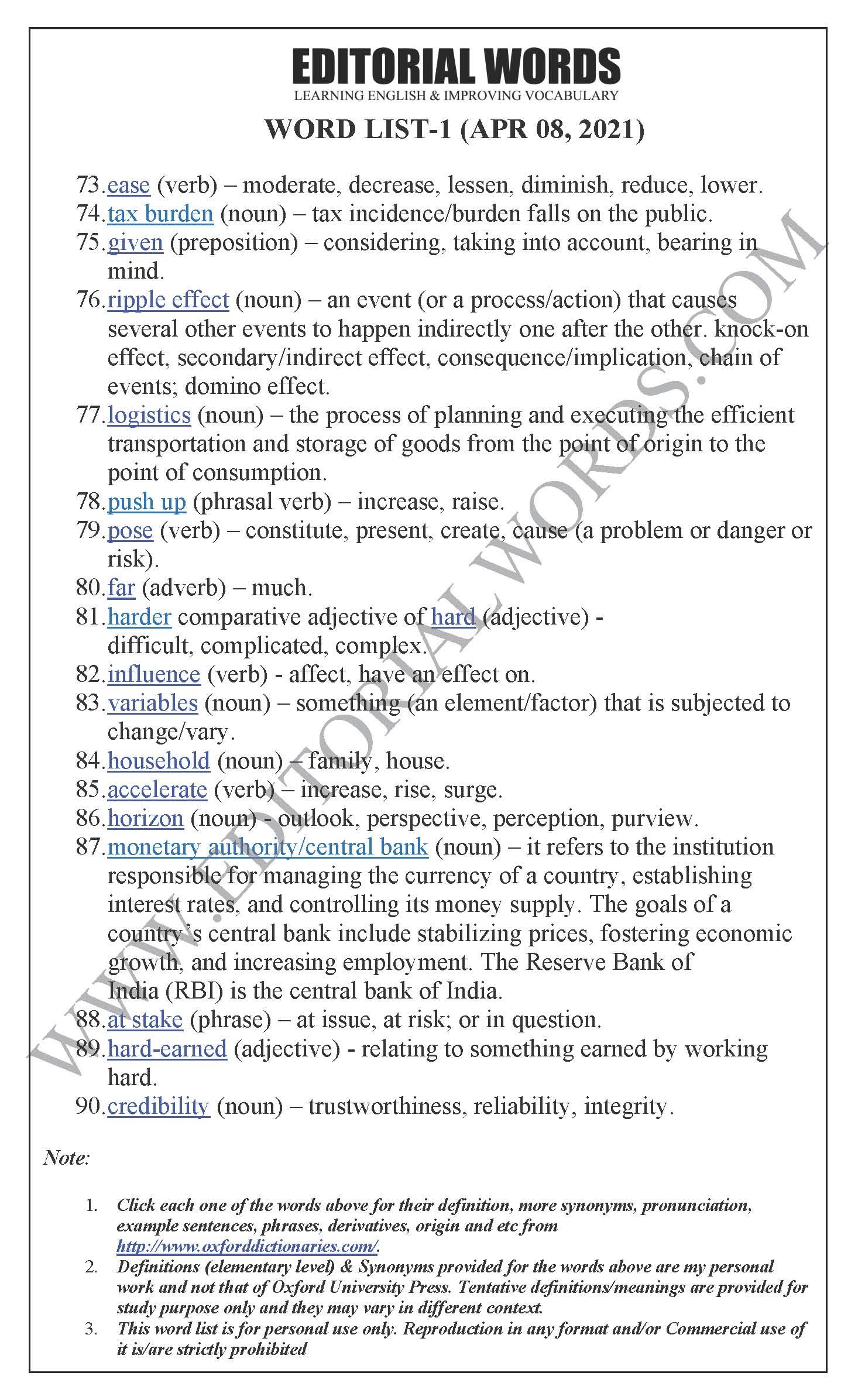
“Phrasal Verbs” We Learnt Last Week
“Idioms & Phrases” We Learnt Last Week
“Important Definitions” We Learnt Last Week
Recent Word Lists For The Hindu Editorial Articles

Be the first to comment